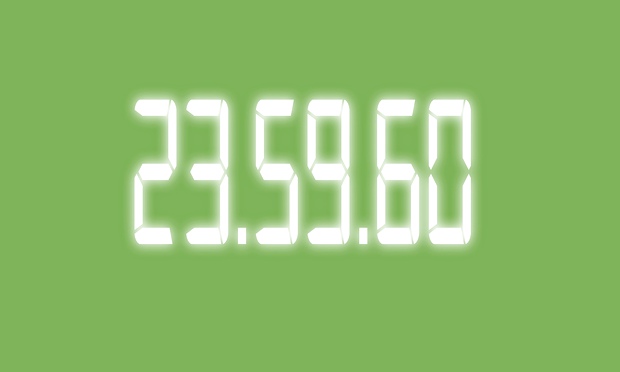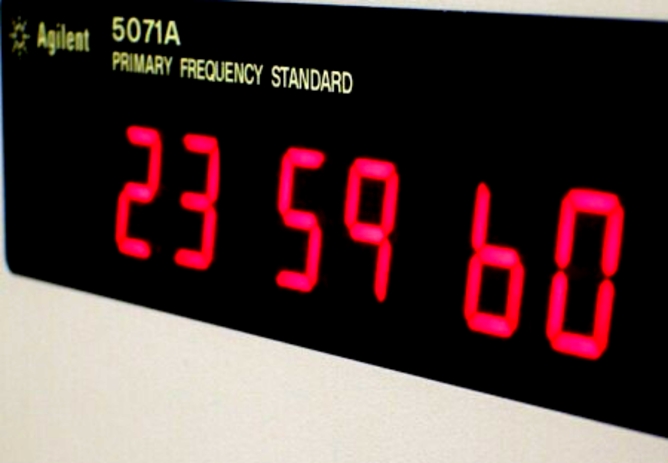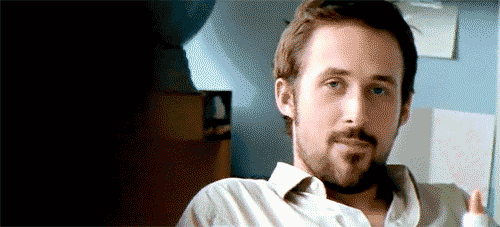Tonight You'll Have An EXTRA Second And It Could Wreak Havoc Across The Internet
In our 30th Tech Tuesday column, we look at why on 30th June 2015, an extra second will be added to it. Blink and you could miss it. It has created a lot of controversy for such a small moment and may cause other inevitable and unpredictable chaos.
On 30 June at precisely 23:59:59, the world's atomic clocks will pause for a single second. In other words, the atomic clocks will change to the uncharted time of 23:59:60 — before ticking over to the more worldly hour of 00:00:00 on the morning of 1 July 2015.
But why do we need an extra second to begin with?
In the words of Markus Kuhn, Senior Lecturer in Computer Science at University of Cambridge: "to reconcile the differences between two definitions of time: one astronomical, the other provided by atomic clocks."
Wait, could you explain that a bit clearly?
Sure!
The decision - to add an extra second - was made by the International Earth Rotation Service (IERS) earlier in January 2015. It's called leap second and it is to be inserted at the very end of 30 June.
As The Guardian notes, leap seconds are surprisingly common. Since their introduction in 1972, we have gained 25 seconds and lost none. So why are leap seconds necessary?
"Over centuries, the Earth has been slowing down. Atomic clocks keep much better time than the Earth itself. They are more than a million times more stable," says UK's leap-second expert Peter Whibberley, of the National Physical Laboratory in Teddington.
Coordinated Universal Time, which the world abides by, comprises the average time of 400 caesium atomic clocks globally, all ticking away at the highest level of accuracy.
"Previously the Earth was the ultimate reference and man-made clocks were adjusted to match. From the beginning of the 1960s, atomic clocks became the ultimate reference. They were adjusted to keep in step with the Earth. Then, in 1972, it was decided that, instead of adjusting how fast the clocks ticked, they would be left to tick away at the atomic rate and the leap second would be introduced," says the leap-second expert.
But why keep adding these leap seconds every now and then? Why not save all the leap seconds and have a leap minute in 2115?
Because if we don't keep adding these leap seconds, the primordial link between our notion of a day and the rotation of the Earth could be forever disrupted.
As per a Gizmodo article, experts also fear that once this link is broken it could never be restored because although the Earth's timekeeping systems are built to accommodate the occasional leap second, adding a leap minute or hour to global time would be virtually impossible.
In other words, you could go really crazy! You see, leap seconds mess with technical systems. How?
Back in 2012, the last time a leap second was added, it wreaked havoc across the Internet, disrupting websites from around the world including Mozilla, Reddit, Foursquare, Yelp, LinkedIn, and StumbleUpon. It also delayed 400 Qantas flights.
"If you move to minute adjustments, you simply make the problems bigger," UK's leap-second expert Peter Whibberley.
It mostly has to do with NTP, or the Network Time Protocol computers use to sync with atomic clocks. If a computer sees the same second twice in a row, it logically thinks something went very wrong. There are fixes to this, but they've obviously not been implemented across the board.
 gizmodo.com
gizmodo.com
In the case of Reddit, the problem was eventually traced back to a Linux subsystem that got confused when it checked the Network Time Protocol only to find an extra second.
Speaking to Wired about the problem back in 2012, Linux creator Linus Torvalds commented: "Almost every time we have a leap second, we find something. It’s really annoying, because it’s a classic case of code that is basically never run, and thus not tested by users under their normal conditions."
Think of leap seconds as the Y2K bug
Leap seconds are like the Y2K bug in that they threaten to throw out of sync time as measured by computers and time as measured by atomic clocks. But while Y2K was a single instance (computer systems that were used to abbreviating the year to two digits were confused by "2000" and "1900"), the addition of leap seconds are a regular problem.
Leap seconds are also broadly unpredictable: earthquakes, tidal drag, and the weather all affect the rotation of the Earth, and it’s up to the scientists at the International Earth Rotation Service to keep an eye on things and call the changes as they come.
What's the workaround?
Google’s "leap smear" is perhaps the best-known example.
As the company’s site reliability engineer Christopher Pascoe explained in a blog post, the usual fix is to turn back the clocks by one second at the end of the day, essentially playing that second again.
However, says Pascoe, this creates problems: "What happens to write operations that happen during that second? Does email that comes in during that second get stored correctly?"
Google’s solution is to cut the extra second into milliseconds and then sprinkle these tiny portions of time into the system imperceptibly throughout the day.
"This [means] that when it became time to add an extra second at midnight," says Pascoe, "our clocks [have] already taken this into account, by skewing the time over the course of the day."
A second may seem trivial, but it is a matter of great controversy
Some of the 170 countries represented at the International Telecommunication Union - the US, France, Mexico and Japan, for instance - want to end the leap second and simply let atomic clocks run away from Earth. In centuries, when all those missed leap seconds make an hour, each country could simply shift their clock forward or back. Russia and the UK want to defend it.
“The debate started in 2000,” says Whibberley, which shows that time moves slowly in this field. But the fate of the leap second may become clear at the next World Radiocommunication Conference in November.
It seems wrongheaded to devise a means of measuring time accurately, and then decide that the Earth is out of sync with it. The Earth’s timekeeping is unpredictable. It slows down and speeds up. But that doesn’t mean we can’t follow it. The Earth’s supremacy on one hand; an inconvenience to LinkedIn users on the other. It’s a tough call.
Daniel Gambis, director of the IERS, says, a second is not to be undervalued. “In one second, satellites can advance 7km. In one second, someone could buy Greece.” So he is in favour of the leap second? “It’s important to maintain the contact with astronomy and not only physics,” he says. “We are living on Earth.”
While, in June, it's unlikely that we'll see leap seconds causing planes to crash, it is impossible to predict what will happen when the leap second is added this year, says Demetrios Matsakis, the Chief Scientist for Time Services at the US Naval Observatory
“There will definitely be failures of some systems — how significant, I don’t know,” he said. “I would suggest not to be in the air flying when the leap second is enacted.”
Matsakis said it is difficult to prepare computer systems for the added second. In addition, the fact that leap seconds must be input by hand leaves a lot of room for human error.
“A lot of modern systems don’t work well with leap seconds,” he said. “The biggest problem is the computers will think that time has gone backwards, and a lot of computer programs, like Oracle for example, think ‘somethings going wrong here’ when they see time going backwards, and they shut down.”
Arguing for the elimination of leap seconds, the Chief Scientist for Time Services at the US Naval Observatory, which sets the precise time for all forms of digital communication, including the Internet, banking systems, GPS, and cell phone networks, said this:
“A lot of modern systems don’t work well with leap seconds. The biggest problem is the computers will think that time has gone backwards, and a lot of computer programs, like Oracle for example, think ‘somethings going wrong here’ when they see time going backwards, and they shut down.”
The unpredictability of the speed of Earth’s rotation poses additional problems. Matsakis said someday, a second may have to be subtracted, which would cause even more issues. In his view, the best solution is to get rid of the practice of the leap second entirely.
"We should eliminate leap seconds because of the real-world practical impossibility of reliably implementing them, due to either their inherent nature or to general lack of knowledge of their very existence," he said.
“There’s no correct time. Isaac Newton thought there was an absolute time but Einstein showed there wasn’t, that time is relative,” he said. “Whatever the clocks say is the time, is the time, and as long as we all agree on it we can synchronize our society.”
Comment to let us know what do you think about it. Meanwhile, here's how you could, possibly, spend this extra second:
Watch the atomic clock change to 00:59:60 (British Summer Time).
Instagram the second (IF you can).
Make a Vine of you Instagramming the second (Double dare).
Or simply wink at someone! ;)


